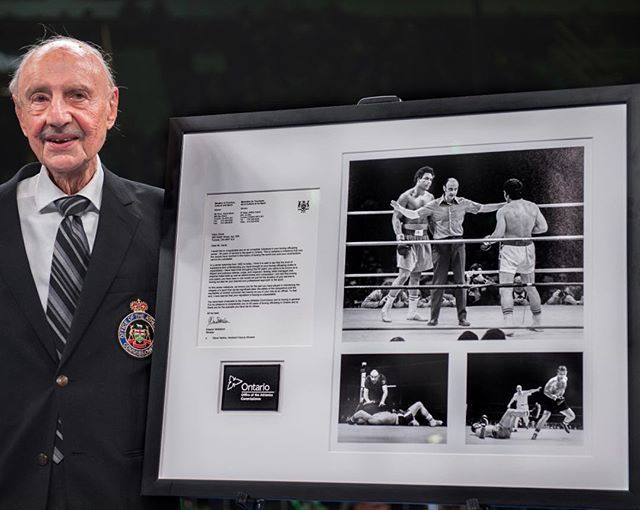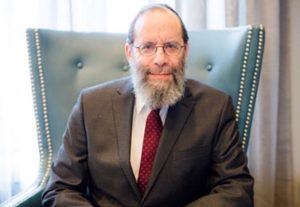To his friends and family, Harry Davis was a nice guy who wouldn’t hurt a fly.
But he was also a renowned Canadian boxer, boxing referee and international judge whose participation in the sport spanned 77 years.
He died in Toronto on March 27 at age 97.
As a boxer in the 1930s he was described as “the tall, long-armed kid who throws his fists like pistons,” his son Alan said at his funeral. He ended his career in the ring with an amateur record of 15 wins and five losses.
As a referee, he officiated at fights with Lennox Lewis, George Foreman, George Chuvalo and Aaron Pryor (vs. Nicky Furlano). He judged fights with Frans Botha, Roy Jones, Shane Mosley and Bernard Hopkins, and he met iconic boxers from the ‘Golden Age’ including Joe Louis and Jack Dempsey.
In addition to his career in the ring, Davis appeared in Norman Jewison’s 1999 movie The Hurricane and Meg Ryan’s 2004 vehicle Against the Ropes, playing a senior ring official in both films.
“In 2019 at age 92, he decided on his own terms it was time to leave the ring,” his son Alan told The CJN. “It’s a world record by all accounts in the officiating of boxing.”
“You didn’t hear much about Harry but that’s a good thing for an official,” Luke Kotyk, Ontario’s athletics commissioner told The CJN. “As a boxing judge or a referee, you must be fair, unbiased, very analytical, and able to dissect all the action that’s happening—every single punch that’s landed, every round. It’s not an abstract art—there’s a science to it.
“At the same time, the best quality of an official is that they remain unseen. The athletes are the focus of the match. If you hear about the officials, it’s because they make a mistake or there’s controversy. If you don’t hear about them they did their job and they did it well. And Harry was one of those.”
Harry’s father Sam Davis sailed from Rotterdam to Halifax in September 1913, leaving the small-town life of Apt, Poland, for the city of Toronto. He opened a convenience store, Davis Cigar, across from the Toronto Western Hospital—and shortly thereafter married wife Sarah and had four children, including youngest son Harry.
Harry lived with his family behind the store and would often jump on the back of a horse-drawn milk cart to get to Ryerson Public School, which he attended until age 16.
It was a heady time for boxing in Toronto, and it was especially appealing to boys in the burgeoning Jewish community who learned to box at the YMHA at Bloor Street and Spadina Avenue. Davis Cigar became an integral part of the Toronto boxing scene in the 1940s and 1950s.
“He left school to help at the store,” son Alan explains. “As a young teenager he started boxing—he was just 16 when he had his first bout. He was fortunate to be trained by Dave Yack, the brother of Toronto boxer Baby Yack, a Canadian bantamweight champion. My dad was 140 pounds and in the lightweight division. He had dark-blue boxing shorts emblazoned with a Magen David which he wore with enormous pride. Boxer Sammy Luftspring, gave them to him.” Luftspring made the 1936 Canadian Olympic team but refused to compete in Nazi Germany.
Although Davis enjoyed amateur boxing, he wasn’t interested in turning professional.
Then, in 1952, one of his friends suggested he apply to be a referee.
He wasn’t alone for long as he embarked on this new stage in his boxing career. He met his future wife Beverley at the Hadassah Bazaar in Toronto—and, as if predetermined, their wedding was on Boxing Day.
Davis was a father of three and relished having his children present at work. “When we were kids, my dad would take us to boxing matches throughout Toronto and sometimes beyond.
“We would carry his bags and he’d always tell security ‘they’re with me’. We met unconventional characters like Porkchops, The Duck, The Weasel and a guy simply known as Him,” his son Alan recalled.
In the 1960s, ‘70s and ‘80s Davis refereed hundreds of amateur fights in Toronto for local boxers including George Chuvalo, Clyde Gray and Donovan Boucher, and he forged lifelong friendships with many of them. He also refereed professional bouts with Canadian Olympic boxers who turned professional including Lennox Lewis, Shawn O’Sullivan and Willie DeWit.

In 1975, Davis refereed one of his most memorable events. Heavyweight champion George Foreman fought five opponents in one afternoon at Maple Leaf Gardens at a match designed to reignite his career after losing to Muhammad Ali at the famous ‘Rumble in the Jungle’ in Zaire. Wide World of Sports broadcast the mega-event on ABC, with Howard Cosell and Muhammad Ali providing commentary. Foreman won all five fights.
Although he refereed thousands of matches, Davis’s proudest professional achievement was that no contestant ever sustained a serious injury. “He was a gentle man and a gentleman,” daughter Sandi explained in her eulogy.
As a referee, Davis was continually on his feet in the ring and encouraged by his wife Beverley, he embraced a fitness and diet regimen to ensure that he stayed in shape. He continued to walk 45 minutes a day and trained regularly with weights until the week before he died.
He refereed matches from 1952-2001, retiring at age 75. Toward the end of his career as a referee, he transitioned to judging.
He judged hundreds of matches as a member of the International Boxing Federation (IBF) and more than 70 world title fights in Canada, the United States, Mexico, South Africa, Thailand, the Philippines, the UK and throughout Europe for the IBF and other boxing organizations.
“Harry’s first IBF world title fight was on October 14, 1988, where Simon Brown retained his Welterweight title by unanimous decision against Mauro Martelli in Lausanne, Switzerland,” IBF president Daryl Peoples told The CJN. “He judged his last IBF championship on May 2, 2015. He was a fixture at IBF conventions, greeted everyone with a warm smile and was always willing to share his encyclopedic knowledge with our members. He was an integral part of the IBF family.”
In 2000, his son Alan also became a licensed Ontario boxing judge and worked with his father. “In many contests we represented two of the three judges. I had the good fortune to work with him for more than 20 years.”
But Davis’ most significant experience when he was judging internationally happened outside the ring. He was in Poland and the day before the fight a Jewish boxing manager asked if he would accompany him to Auschwitz. Harry toured the camp, judged the match and the following day returned home in tears interrupting a large family dinner.
“The visit had a profound and lasting impact on my father in both appreciating the fact that he was Canadian-born and more importantly fostering a greater understanding of the horrors of the Holocaust,” his son Alan said.
In 2018, the Ontario Athletics Commission honoured him for 65 years as a boxing official. He was also the recipient of a Lifetime Achievement Award Belt from the International Boxing Federation.
“We will all miss Harry deeply and continue our campaign to have his career memorialized in the International Boxing Hall of Fame,” Peoples said.
Davis is survived by his wife of 69 years Beverley, children Alan, Sandi and Lorne, grandchildren and great-grandchildren.







